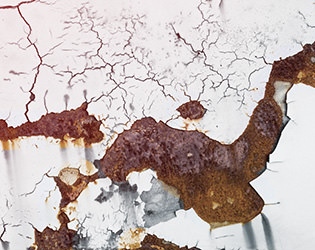
Rust inhibitors – How to effectively protect tools, implements and materials from corrosion
Corrosion is a constant threat wherever metals must meet high demands and are exposed to strong environmental conditions. This can be on vehicles that run in wet weather, it can affect machines and tools used in open assembly halls, or metal parts that come into contact with aggressive liquids. The only way to prevent functional failure, wear and tear and the need for expensive repairs is to use the right corrosion protection. Semi-finished products or finished products made of corresponding materials must also be protected in order to arrive at the customer in impeccable condition. In this article we will show you what corrosion protection is all about, why it is so important and which rust inhibitor is right for you.
What is corrosion anyway?
In a technical context, corrosion is basically the change in a metal due to electrochemical or physicochemical interaction with another substance. In simpler terms, a metal reacts with another substance, such as liquid like water. This causes a chemical reaction that “transforms” parts of the metal. The best-known corrosion is the oxidation of iron, which is rusting. In this process, iron, water and the oxygen in the air interact to gradually turn the common material iron into iron oxide, which requires protection by a rust preventative. Since this has much worse physical properties, the material becomes unusable, the component no longer functions, and the machine comes to a standstill. Rust alone causes billions of dollars’ worth of damage every year. Consequently, Corrosion protection is not a luxury, but an economic necessity.
What does corrosion protection mean?
Corrosion protection is essentially any measure designed to prevent or actively combat the formation of rust. In most cases, proper and, most importantly, timely corrosion protection can significantly extend the life of a component or material. It often protects the system in question from functional failure and the need for repair for many years. Elements of water circulation systems or pipelines are often treated with this active rust inhibitor. But much more important for the commercial sector is the passive corrosion protection.
What is passive corrosion protection and who is it most important for?
Passive corrosion protection refers to all measures that are intended to protect a metal from attack by oxidation by specifically treating and shielding it. This includes measures such as the well-known hot dip galvanising or the priming of surfaces with a rust inhibitor before painting. It is important with these measures that the metal parts are treated thoroughly over the entire area. Otherwise, it is possible that rust will then increasingly form in the few areas that are not protected.
Passive Corrosion protection is important for all companies that work a lot and often with metal. Machines and tools in particular should be protected against excessive wear caused by rust. The same applies all the more, of course, if the metallic materials are customer property. Thus, no professional workshop will do without corrosion protection when treating customer vehicles. Basic rust protection is also obligatory for all paint repairs and paintwork.
We have these corrosion protection products for you in our range of products
Caramba’s extensive range has a variety of solutions for all requirements. This of course includes corrosion protection. With the Caramba Adhesion Primer, for example, we offer you an ideal rust protection primer for paintwork. The high performance zinc spray provides galvanic protection for paintwork but also for repairing existing zinc coatings – incidentally also available as a light-coloured spray for treatments without subsequent painting. Finally, the multifunctional corrosion protection wax is not only suitable as an underbody protection wax thanks to its elasticity and creep ability, but also for temporary corrosion protection during storage or transport.
Corrosion Protection Oil 200 L, when excellent corrosion protection is required, for example, in production, storage or shipping.